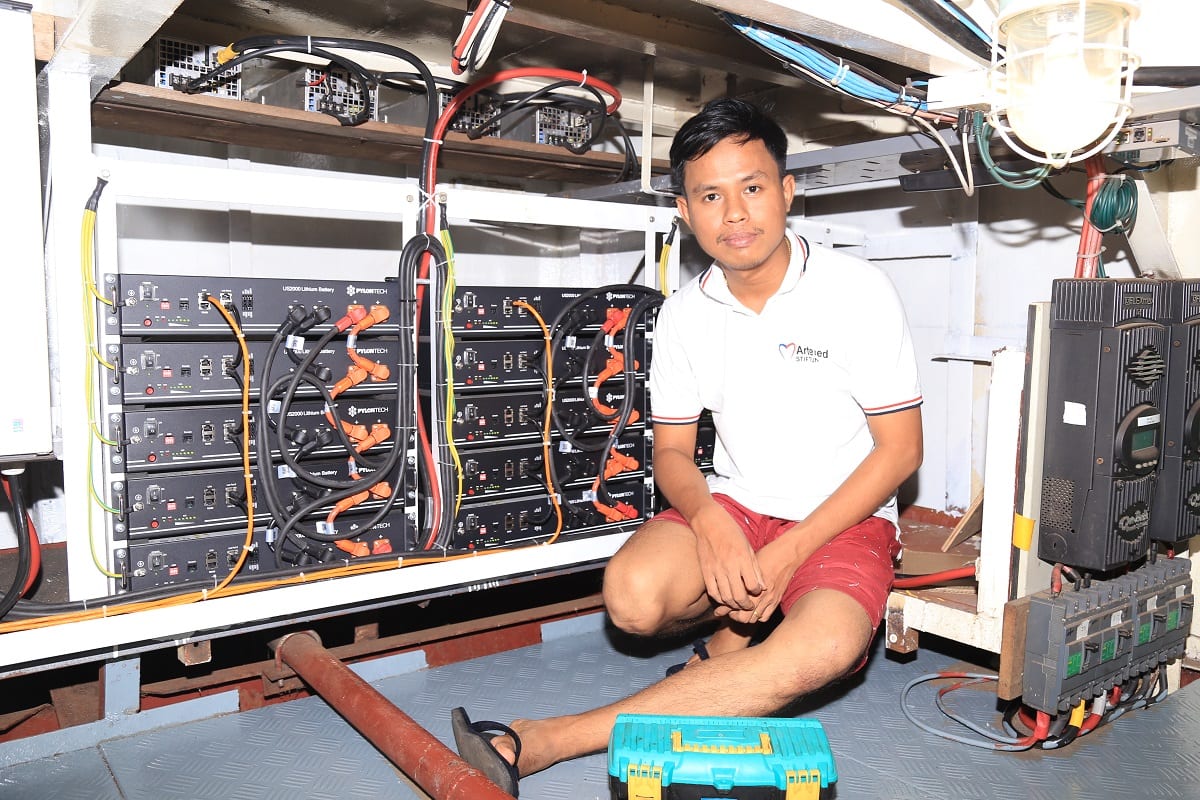For almost three years now, the "Polli", the floating clinic run by the doctors, nurses and crew of the Irrawaddy River Doctors has been making its rounds from village to village in southern Myanmar. Extreme climatic conditions such as vertical sun, steam, heat and heavy rain, combined with intensive use of the technology, take their toll and ensure that the technical systems are constantly subject to high levels of wear and tear. One of the most important requirements on board is a 100% reliable power supply under all conditions, in any weather, at any time of day. In sunny weather, this can be achieved with solar systems; in bad weather or at night, power generators and battery systems must provide the necessary energy.
While common battery systems in this country provide many years of reliable service, they have to be replaced in Myanmar under the extreme operating conditions there, they have to be replaced after 2-3 years and dozens of toxic batteries actually have to be disposed of regularly in an environmentally friendly manner. Unfortunately, in Myanmar recycling is almost unknown and the common disposal is unacceptable from an environmental point of view. After maintaining a stable power grid on board became increasingly difficult due to the worn out batteries, the foundation decided in the fall of 2019 to invest in a state-of-the-art new battery technology, completely unknown in Myanmar , to provide long-term power to the ship. Financial help from donors as well as technical and logistical support from the electronics company Rohde & Schwarz encouraged the foundation to tackle this challenging conversion project. Unlike the previous, conventional system, the new technology can withstand high temperatures and daily, intensive use for many years.
But a long road and unexpected hurdles awaited us. The new battery technology, for example, is classified as a high category hazardous material. Only after several safety reports had been submitted was the shipping company prepared to transport our equipment in a container. Customs and import regulations for this new technology in Myanmar required further extensive preparations. Hardly underway, hurricane 'Sabine' forced our cargo ship to anchor on the high seas for weeks; continuing the journey was too dangerous even for a gigantic container giant. It was only after a long delay that the journey of our plant continued. Finally, the arrival in Myanmar seemed to be plannable. But suddenly Covid-19 thwarted all travel plans. With airline tickets in hand, the technical team was sitting on packed suitcases when the airline canceled all flights at short notice. To this day, entry to Myanmar is prohibited for all foreigners until further notice.
When public life was almost at a standstill throughout Europe due to the lockdown, our container reached the port of Yangon. Our local manager Min Min urged us to hurry, as the authorities in Myanmar were also considering the first closures. The container was unrolled as quickly as possible, the wooden crates weighing several tons were transported by truck to the ARTEMED office in Bogale and unloaded there by the crew late in the evening. The next day, Tag , the lockdown imposed by the Burmese government, which is still in force today, also applied there. So on the one hand, we were happy to have brought our valuable cargo to Bogale safely and just in time, but on the other hand, in addition to the expected technical team, special installation material that should have been brought by the German team was suddenly missing.
Unfortunately, due to the lockdowns, all air freight to Myanmar had been stopped in the meantime, with the result that the missing material from Germany could also no longer be forwarded. What to do? High-quality urgently needed equipment was safely stored in our office in Bogale, but the urgently needed installation suddenly seemed to be in the stars. And so a new, daring plan was devised: the missing material was to be procured from China, and our local technician Khaw Thu was to install the equipment on his own with remote support from our team. We had no choice - and so the plan was implemented: With logistical support from Rohde & Schwarz, we actually succeeded, with considerable effort, in procuring the missing important material via detours in the neighboring country and delivering it to Bogale. After that, the way was finally clear for installation!
Detailed technical documentation and circuit diagrams were prepared and sent to Khaw Thu via E-Mail for familiarization. Daily training and intensive support via telephone and video chats by our technical manager Henrik Rausch brought the local technician up to the necessary level of knowledge and gave him the courage to tackle the difficult installation task in mid-June. In continuous exchange, the previous battery room in the ship's hull was gutted, new brackets and frames welded in, painted and the new equipment successively scaffolded. After only two weeks, all the components supplied were fully assembled. The big moment came - via video chat from Germany lasting several hours, the new system was switched on, checked and tested together for the first time. With complete success! The system ran right from the start and has been supplying the ship with electricity continuously ever since. A masterpiece of our team, which would have been unimaginable a few months ago.



